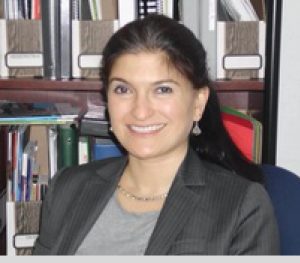Newbie candidate workshop gives tips to survive ballot challenges
By Jean Lotus Staff reporter — December 6, 2016
Maryam Judar, executive director of Elmhurst’s Citizen Advocacy Council. (Photo courtesy of Twitter)
There are approximately 7,000 different units of government in the state of Illinois, and almost all of them are selected by the electoral process.
Finding good candidates to run for local offices such as park commissioner, library trustee or school board is sometimes tricky and novice mistakes can torpedo a newcomer’s candidacy. This is especially true in Cook County, where Clerk David Orr has said hardball frivolous petition challenges and other incumbent-protecting measures need to be reformed.
Members of the Elmhurst-based non-partisan Citizen Advocacy Center came to the Berwyn Public Library Nov. 29 to share tips and best practices for getting on — and staying on — local ballots in suburban Cook County.
“Ballot access is intrinsic to whole democratic process,” said CAC Executive Director Maryam Judar. “But the reason we are here today is because ballot access isn’t as easy as it sounds.”
Judar and Ben Silver, two public interest lawyers, were invited by Ixchel, a group of Cicero community activists who study education and environmental issues. The “Candidate 101” workshop was especially designed to encourage minority men and women to run for office.
About 20 participants were there for curiosity, or because they were planning a run for office.
“I’d like to educate myself, if I can, about policy and government and any kind of legal advice you can give me about the hoops we need to jump through,” said a man who identified himself as “Tony” from Cicero.
A South Berwyn School District 100 board member, Elizabeth Jimenez, said she wished she had attended a similar workshop before she ran for school board.
“Unlike all of you who are here for civic engagement, I did it very naïve,” Jimenez said. “Not many people are aware of how political [getting on the ballot is]. You have to go through all these legalities, and that’s why I’m here.”
The deadline for candidates to file their petition signatures and paperwork in consolidated local elections is during the weeklong window of Dec. 12-19.
Candidates and citizens have the right to file objections to nominating petitions until Dec. 27.
“It’s unique to Illinois how adversarial [the challenging of nominating petitions] is,” Judar said. “People fight tooth-and-nail to get each other knocked off the ballot.”
Candidates must be residents of the district they want to represent for at least a year, and be at least 18 years old, Judar said. “People who’ve been convicted of felonies such as bribery, perjury or other ‘infamous crimes’ are not allowed to run for some offices.”
Scofflaws who owe fine money to the municipality they’re running to govern may also be kicked off the ballot, in certain towns.
“It’s a good idea to check in with an election attorney, if you can afford one,” Judar said. “[CAC has] helped candidates in the past,” she noted.
An Economic Interest Statement and Loyalty Oath are self-explanatory. A statement of candidacy must include a candidate’s name as it will appear on the ballot.
“You can’t change your name for the ballot, or put a phrase in quotes, such as one candidate Les “Cut the Taxes” Goldman did. It needs to be something that has been your name for your whole life, and should be consistent throughout all your paperwork.”
Candidate signatures must be submitted on notarized, numbered pages that are fastened together, and should be photocopied for your own records, Judar said.
“Once you have your signatures on petitions, lock them up,” Judar said. “I personally know of one state representative whose petitions were stolen right off his desk.”
Sheets collected by each circulator must be notarized individually. If a petition passer has problems with paperwork, such as proof that they weren’t present for the notarizing, all the sheets passed by that petitioner may be thrown out.
“It’s not a good idea to use paid circulators, in general,” Judar said. “If challenged, they must attest to every single signature they collected.”
Circulators must also be at least 18, but don’t have to live in the district where they are collecting signatures.
Any voter in the district can object to nominating papers within five days of filing period, Judar said. A hearing will either take place at the Cook Co. Election Board’s offices or with the local election board, which will likely consist of a mayor or village president, the village clerk and the longest-serving trustee.
“When signatures are challenged, it’s a painstaking process,” Judar said.
“Following directions when it comes to filing nomination papers is important,” she said. “The best offense is a good defense — to avoid having a problem before a local board, you want to make sure your signatures are good and make sure you’re following the rules as you go along,” she said.
Read the current issue of the Cook County Chronicle
Free subscription to the digital edition of the Cook County Chronicle
— Newbie candidate workshop gives tips to survive ballot challenges —



